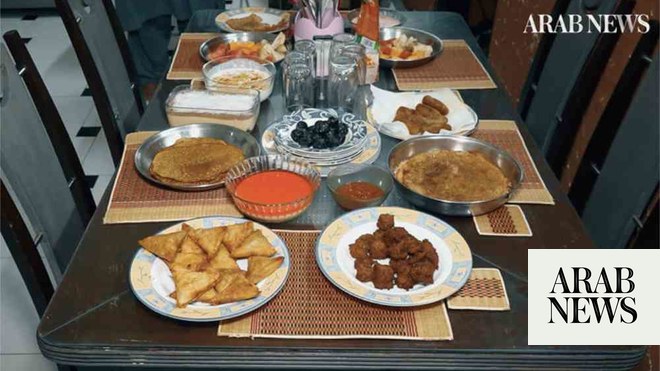
Abu Atwan has operated as musaharati in his neighborhood west of the city of Rafah in the southern Gaza Strip for the past seven years
GAZA STRIP: Despite the march of modern technology, Abdel Khaleq Abu Atwan continues to beat the drum for the age-old traditions of Ramadan in Palestine.
Every year, during the holy month of fasting, the hairdresser and father-of-three takes on the role of musaharati, the name given to the person who walks residential areas to wake worshippers for their sahoor meal.
It is a custom that has been passed down through generations and remains a deep-rooted part of Ramadan for many Muslims.
As Abu Atwan roams the streets before dawn prayers, adults and children often come out of their homes or peer from windows to watch him pass by beating his drum while reciting prayers.
Although modern technology can now be relied upon to alert worshippers, many Palestinian communities continue to adhere to the time-honored ways.
Abu Atwan has operated as musaharati in his neighborhood west of the city of Rafah in the southern Gaza Strip for the past seven years. Wearing a traditional Palestinian costume along with a red hat and white scarf, he weaves his way through the streets banging his drum for around 90 minutes before returning home to have a sahoor meal with his family.
He told Arab News that he loved performing the role because of the interaction and appreciation he received from people, especially when he recited hymns about the importance of fasting and worshipping God, and slogans urging national unity and interdependence.
While computers, TV and other technological developments had changed the habits and lifestyles of many people, he said the musaharati role was still respected and had maintained its popularity in many communities.
The Israeli blockade and political turmoil has adversely affected all aspects of life for the 2 million Palestinians living in the Gaza Strip but Abu Atwan noted that these issues had not diminished enthusiasm for the musaharati.
Due to the coronavirus disease (COVID-19) outbreak Abu Atwan has seen a dramatic fall in business at his hairdressing salon. However, although his work as a musaharati was voluntary, he said he sometimes received money and other gifts from people in honor of his role, which helped in the deteriorating economic climate.
Abu Atwan is accompanied on his Ramadan rounds by his friend Mohammad Shaath, 25, who said he enjoyed being able to bring smiles to the faces of people while chanting religious and patriotic hymns and slogans. Shaath added that musaharati rituals were among the most important features of Ramadan.












